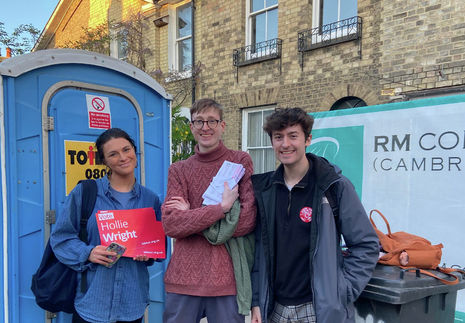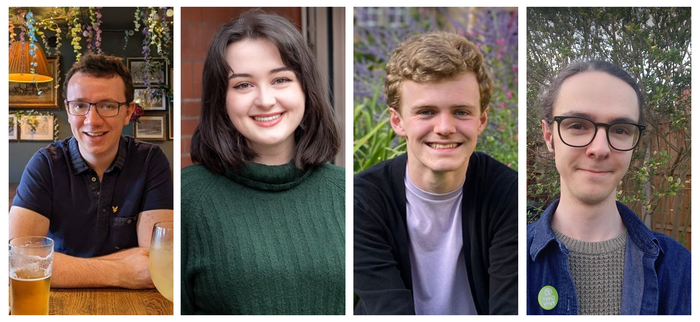‘Fellows wish me luck when I pass them’: Cambridge students on why they’re running for office
With polls opening for the local elections tomorrow, Varsity speaks to the candidates about why so few students run for local office, the accessibility of politics, and tips for young people wanting to get involved

Last month, students migrated back for the start of Easter term to a Cambridge transformed. As spring arrived trees were flourishing, flowers were blooming, and the streets were gradually peppered with bright party signs. Election season had started.
Most students can register to vote in the local elections where they study as well as where they reside during holidays. But a few take their electoral engagement even further. On Thursday (5/5), a total of seven Cambridge students will be on the ballot.
We sat down with some of the candidates: Labour’s Hollie Wright and Sam Carling, as well as Alex Carter, a Liberal Democrat running for council in his hometown of Brentwood.
The candidates have found the university community to be supportive of their campaigns. Wright said that students are often “surprised” that their peers have a shot at winning as opposed to standing as “paper candidates”, as has been the case in the past. News of their candidacies has spread quickly within the Cambridge bubble – Carling recalled fellows passing him in college wishing him luck.
He admitted that the response has been more mixed from residents. While some were visibly “enthused” about young people running for election, others were hostile – one voter even swore at him on the doorstep. “On balance, it’s probably about equal”, he tells me, saying that it can be “cathartic” to laugh about negative experiences with his fellow campaigners. Carter, who took just 9% when he last contested his ward as a Lib Dem, blamed negative responses on people’s perceptions of the national party, whilst Wright said that residents’ reactions to her age were “surprise” rather than hostility.
Carling lamented that “we just do not have enough young people engaged in electoral politics”. His fellow candidates agreed. Whilst the median age of the UK population is 40, the average council candidate is almost twenty years older at 59. As a result, Carter believes the youth voice “traditionally has not been heard” in local government. Wright, on the other hand, said that the “voice gap” between students and residents in Cambridge was in part what prompted her to run. While individual students may be transient, she explained, the student population is a permanent, “integral” part of Cambridge’s culture, economy and identity.
The candidates have seen how students have different concerns to residents on some issues. While both are concerned about the environment and the city's homelessness crisis, on other issues their interests diverge. Carling pointed out that “obscene” house prices often “oblige” students to leave Cambridge after graduation. However, these same prices increase the value of homeowners’ assets. He concluded that unless students get involved in politics, their interests will not be fairly represented on the council.
Most importantly, why more students don’t engage with electoral politics? Carter does not believe they are stopped by any “established barriers” created by the parties. Carling, who has run numerous selection meetings for his local Labour party, rarely sees young people put themselves up for selection. Young people have “other things we want to do with our time”, such as “socialising”. The end result is that running for office “doesn’t come into people’s heads”. Wright believes that people can find the idea of seeking office “daunting”, but suggested joining a political party or a political society. Carter told people who might be interested in seeking office “just to get involved”, saying he had learnt a lot over the course of his run. Carling suggested the same, but said of young people who might be interested in seeking office: “they can talk to me.”
Polls are open tomorrow (5/5) from 7am to 10pm.
 News / Hundreds of Cambridge academics demand vote on fate of vet course20 February 2026
News / Hundreds of Cambridge academics demand vote on fate of vet course20 February 2026 News / Judge Business School advisor resigns over Epstein and Andrew links18 February 2026
News / Judge Business School advisor resigns over Epstein and Andrew links18 February 2026 News / University Council rescinds University Centre membership20 February 2026
News / University Council rescinds University Centre membership20 February 2026 News / Petition demands University reverse decision on vegan menu20 February 2026
News / Petition demands University reverse decision on vegan menu20 February 2026 News / Caius students fail to pass Pride flag proposal20 February 2026
News / Caius students fail to pass Pride flag proposal20 February 2026










